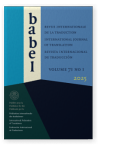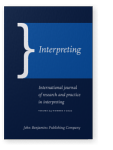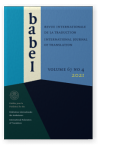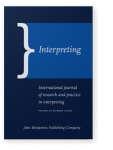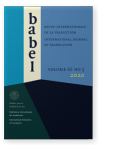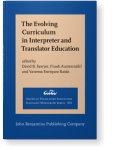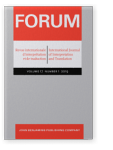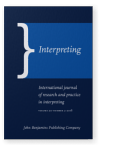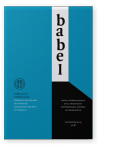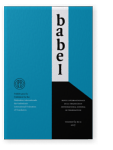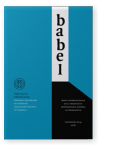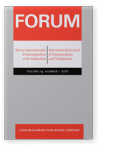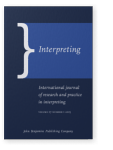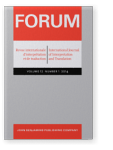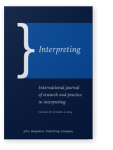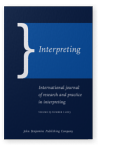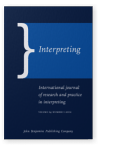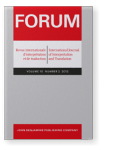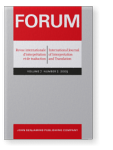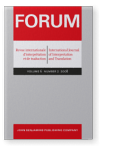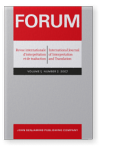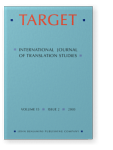Andrew K.F. Cheung
List of John Benjamins publications for which Andrew K.F. Cheung plays a role.
Journal
2022 Listeners’ perception of the quality of simultaneous interpreting and perceived dependence on simultaneous interpreting Interpreting 24:1, pp. 38–58 | Article
With the rise of the use of English as a lingua franca (ELF), the number of conference speakers and attendees who use English is increasing. Simultaneous interpreting (SI) into and from English may be provided at conferences to meet the needs of individuals with differing levels of English… read more
2021 Learning Chinese political formulaic phraseology from a self-built bilingual United Nations Security Council corpus: A pilot study Babel 67:4, pp. 500–521 | Article
This pilot study investigates the formulaic phraseology most frequently used in highly formulaic political documents by examining a self-built bilingual parallel corpus of 43 speeches delivered in United Nations Security Council (UNSC) meetings by Chinese representatives. The study also probes… read more
2020 Interpreters’ perceived characteristics and perception of quality in interpreting Interpreting 22:1, pp. 35–55 | Article
This study examined the link between listeners’ perceptions of the quality of interpretation and their beliefs about the interpreter. Two groups of Mandarin-speaking participants were shown a video of a speech by President Obama being interpreted into Mandarin Chinese by a non-native… read more
2020 Language interference in English-Chinese simultaneous interpreting with and without text Babel 66:3, pp. 434–456 | Article
This study investigated the effect of source language interference during English-Chinese simultaneous interpreting (SI) with and without text by examining the relationships between manifestations of language interference and interpreting modes. A corpus-based descriptive approach was used to… read more
2019 The hidden curriculum revealed in study trip reflective essays The Evolving Curriculum in Interpreter and Translator Education: Stakeholder perspectives and voices, Sawyer, David B., Frank Austermühl and Vanessa Enríquez Raído (eds.), pp. 393–408 | Chapter
This study reports the findings from students’ reflective essays on the hidden curriculum of Chinese/English interpreting training. Grounded theory was used to conduct thematic analysis of 22 reflective essays on the hidden curriculum by trainee interpreters who took study trips to international… read more
2019 Disfluency in relay and non-relay simultaneous interpreting: An initial exploration FORUM 17:1, pp. 1–19 | Article
This corpus-based study explores the effects of relay interpreting at meetings of the United Nations General Assembly by comparing features of disfluency between the outputs of relay and non-relay simultaneous interpreting (SI). The findings are as follows: (1) the output of relay interpreting is… read more
2018 Non-renditions and the court interpreter’s perceived impartiality: A role-play study Interpreting 20:2, pp. 232–258 | Article
This experimental study examined whether non-renditions are linked to the court interpreter’s perceived impartiality. A witness examination was simulated in three variations on a scripted role play, with consecutive interpreting between Cantonese and English. A sample of female Cantonese… read more
2018 Formal ontology for discourse analysis of a corpus of court interpreting Babel 64:4, pp. 594–618 | Article
We develop a new method of discourse analysis using speech act theory and formal ontology. The method constitutes an attempt to make discourse analysis more formal and repeatable. We apply the method to a corpus of bi-lingual, interpreted legal dialogue, focusing on the speech act of… read more
2017 Non-renditions in court interpreting: A corpus-based study Babel 63:2, pp. 174–199 | Article
By examining the types and frequencies of non-renditions in a 100-hour corpus of court interpreting records from Hong Kong, this study demonstrated that court interpreters actively coordinate communication when carrying out their interpreting duties. Non-renditions are interpreters’ utterances… read more
2016 Translators, interpreters, and cultural negotiators Babel 62:4, pp. 682–685 | Review
2016 Paraphrasing exercises and training for Chinese to English consecutive interpreting FORUM 14:1, pp. 1–18 | Article
This study investigates the effectiveness of incorporating paraphrasing exercises into interpreter training, specifically in relation to interpreting from Chinese to English. owever, there is a lack of empirical data supporting the use of paraphrasing exercises in interpreter training. The… read more
2015 Scapegoating the interpreter for listeners’ dissatisfaction with their level of understanding: An experimental study Interpreting 17:1, pp. 46–63 | Article
Anecdotes abound on interpreters being used as scapegoats, but without hard evidence. The purpose of this study was to observe whether Cantonese-speaking listeners blamed the interpreter for unsatisfactory scores awarded to them in a comprehension test, after listening to a simultaneous… read more
2014 Anglicized numerical denominations as a coping tactic for simultaneous interpreting from English into Mandarin Chinese: An experimental study FORUM 12:1, pp. 1–22 | Article
Abstract/Résumé
Cet article présente les résultats de tests pour mesurer l’efficacité de l’utilisation de numéros anglicisés lors de la simultanée de l’anglais en chinois. Les participants ont été répartis en un groupe témoin et un groupe expérimental. Les participants du groupe expérimental ont… read more
2014 The use of reported speech and the perceived neutrality of court interpreters Interpreting 16:2, pp. 191–208 | Article
A mock trial, with two-way consecutive interpreting between Cantonese and English, was used to test perceptions of a court interpreter’s neutrality when interpreting into Cantonese in reported rather than direct speech. Monolingual Cantonese speakers played the part of witnesses using the… read more
2013 Non-native accents and simultaneous interpreting quality perceptions Interpreting 15:1, pp. 25–47 | Article
A controlled experiment measured native Hong Kong Cantonese speakers’ perceptions of the quality of three different simultaneous interpretations (SIs) into Cantonese. The SIs differed only in the interpreters’ accents, native in one case and non-native in the other two. Participants were randomly… read more
2012 The use of reported speech by court interpreters in Hong Kong Interpreting 14:1, pp. 73–91 | Article
This is a corpus-based study that investigates instances in which court interpreters in Hong Kong deviate from using direct speech and the first person, notwithstanding the requirement to use both of these when rendering statements made by witnesses or defendants. Quantitative data indicate that… read more
2012 Omission in Simultaneous Interpreting: Word order differences FORUM 10:2, pp. 19–33 | Article
Abstract/Résumé
Il s'agit d'une étude de cas d'omissions dans 'interprétation simultanée (SI) de cinq interprètes de mandarin lors de la conférence de presse télévisée d’un chanteur pop de Canton en anglais. Des cas récurrents d'omissions sont identifiés, classés et analysés en comparant texte… read more
2009 Numbers in Simultaneous Interpreting: An experimental study FORUM 7:2, pp. 61–88 | Article
L’Interprétation des nombres en interprétation simultanée (IS) est reconnue depuis longtemps comme problématique. Cette étude identifie des modèles numériques dans les restitutions en IS qui s’écartent de la langue source. Elle explore également les différents manières dont ces modèles pourraient… read more
2008 Simultaneous Interpreting of Numbers: An experimental study FORUM 6:2, pp. 23–38 | Article
Abstract/Résumé
Cette étude vise à vérifier la conviction largement répandue qu’un niveau élevé d’exactitude lors de l’exécution de l'interprétation simultanée des nombres peut être atteint avec un entrainement basé sur l’isolement des nombres. Les chiffres ou les numéros constituent un problème… read more
2007 The Effectiveness of Summary Training in Consecutive Interpreting (CI) Delivery FORUM 5:2, pp. 1–23 | Article
Les exercices de résumé sont utlisés durant l’apprentissange des techniques d’interprétation consecutive, mais rares sont les études empiriques sur l’efficacité de cette méthode. Un groupe témoin et un groupe expérimental sont composés pour tester l’efficacité de ces exercices. Le groupe témoin,… read more
2003 Nanqiu, Li. 2002. Zhonguo Kouyi Shi Target 15:2, pp. 395–397 | Review
